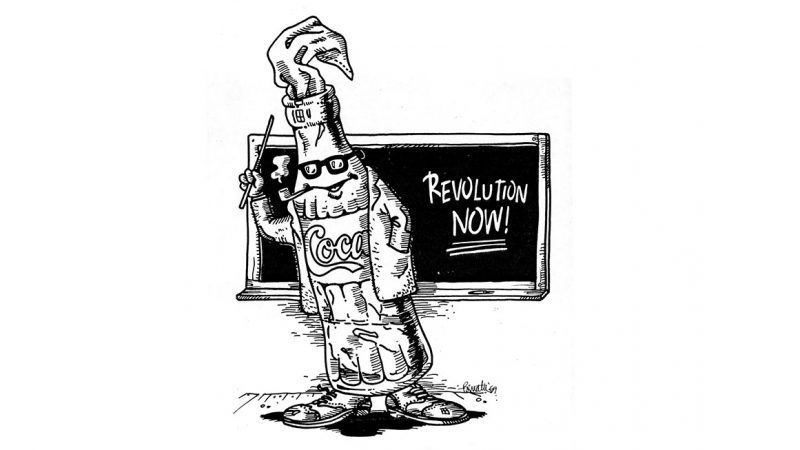From the Archives: October 2019
Excerpts from Reason's vaults

15 Years Ago
October 2004
"In the beginning, supporters of No Child Left Behind argued that its problems were just a matter of districts' adjusting to the new law. But as we begin the third school year in which kids are supposed to be able to escape failing schools, a lack of meaningful choice appears to be the norm."
Lisa Snell
"No Way Out"
"Southern states, home to the nation's poorest citizens yet full of dependable Democratic voters, received less New Deal spending than comparatively richer Western states, whose voters perhaps required additional persuasion to support Democratic candidates. Powell cites one study showing that states with a higher percentage of black residents and a lower per capita income received fewer New Deal dollars than richer, whiter states. Thus blacks were directly injured by New Deal policies, then ignored when it came time to dispense New Deal dollars."
Damon Root
"Bad Deal"
30 Years Ago
October 1989
"Bush is not the first president to treat China as an exception when it comes to otherwise evenhandedly applied norms of human rights. Roberta Cohen, deputy assistant secretary of state for human rights in the Carter Administration, has recently documented how even gross Chinese violations of basic rights were glossed over or ignored by all four of Bush's immediate predecessors. Like Bush, Presidents Nixon, Ford, Carter, and even Reagan exempted China from universally accepted norms because they had been led to place an extraordinarily high valuation on good relations with a stable Beijing regime."
Steven W. Mosher
"The China Syndrome"
"Urban America, except for the favored few who can use The City as a small collection of protected environments—one's well-guarded condominium, one's spiffy, off-limits-to-hoi-polloi restaurants, one's security-obsessed workplace—has become a terror. The City is increasingly expensive and decreasingly efficient. The promise of the melting pot has fizzled into accelerated racial polarization. The crime rate soars as the literacy rate declines. The portrait is depressing, demeaning, despairing—and can be well recognized by almost anybody who lives within urban America."
David Brudnoy
"Unmasking Batman"
45 Years Ago
October 1974
"Is there any libertarian who would not agree that Ayn Rand's The Fountainhead is a literary masterpiece? Probably not. But there are few libertarians who would agree that the film version of The Fountainhead represents an achievement of equal magnitude. Most people seem to judge the movie by the extent of its slavishness to the book. By criticizing all aspects of the film which do not correspond to the revered novel, they fall into the trap that Ms. Rand was intelligent enough to avoid in her screenplay: that is, assuming that in order to be as successful a work of art, the film must be the book."
Charles Derry
"The Fountainhead as Film"
50 Years Ago
October 1969
"Contrast with Raphael's vision of the academy, the picture raised by the idea, 'university,' in most men's minds today. That picture, too, includes a large number of bearded, long-haired, barefoot men, their clothes in disarray. But these figures do not sit—they sprawl, or stand—they slouch, or walk—they march. If they appear in a hall, it is to occupy the floor; if they appear engaged in debate, it is to shout down an opponent. One does not visualize them in small groups, nor does one picture some among them alone, writing or reading or thinking. One imagines them, rather, as a crowd—a disorderly mass joining together in a loud and angry chorus of shouts and jeers. Any resemblance between Raphael's ideal, active scholars and contemporary student 'activists' is entirely superficial. The latter are 'men of action—not of ideas.' They 'Act Now, Analyze Later.' It is not Plato or Aristotle that one would choose to represent in a portrayal of the academy today, it is a rampaging New Leftist."
Cheri Kent Litzenberger
"Philosophical Origins and Intellectual Heroes of the New Left"


Show Comments (3)